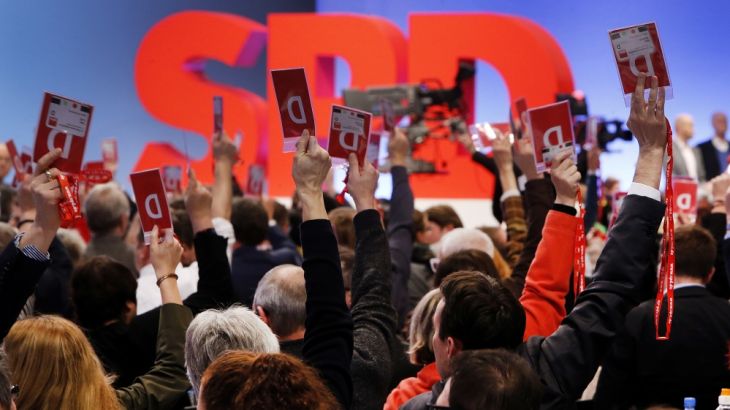Germany: SPD narrowly backs coalition talks with Merkel
Fresh elections avoided for now as Social Democrats approve negotiations with Merkel’s conservatives by 56 percent.

Germany’s Social Democrats (SPD) have narrowly approved the start of formal coalition negotiations with Angela Merkel’s Christian Democrats.
At a special congress held in Bonn on Sunday, 362 out of 642 delegates voted to approve a preliminary coalition deal, paving the way for further negotiations and potentially ending the political deadlock that has prevented a new government from being formed since elections took place on September 24.
Keep reading
list of 4 items‘Nothing to apologise for’: Merkel defends Russia legacy
The mixed legacy of Angela Merkel
What is next for Germany after Angela Merkel?
Martin Schulz, leader of the SPD, called the vote “a key moment in the history of our party” and warned the CDU/CSU that they now face “tough negotiations”.
In September, his party achieved its worst election result since Germany became a federal republic in 1949 and many within the SPD think renewing the “grand coalition” could further weaken the party.
Schulz himself initially rejected the idea of extending his party’s coalition with Merkel’s conservatives but changed his mind after talks between the CDU/CSU, the pro-business Free Democratic Party (FDP) and the Greens collapsed in November.
Up for review
Schulz pledged on Sunday to resist the CSU’s demand to cap migrant arrivals at 200,000 a year and promised that any future coalition government would be put up for review after two years.
Merkel welcomed the decision taken by SPD delegates and said that the parties now face “a lot of work” to form a new government. She called for the talks to be wrapped up by mid-February.
Senior EU figures, too, were pleased with the outcome.
They have been anxiously awaiting the return to action of economic and political heavyweight Germany, hoping to see a government emerge that will unblock key EU reforms.
“Very good news for a more united, stronger and more democratic Europe!” Martin Selmayr, the chief of staff to European Commission President Jean-Claude Juncker, said on Twitter.
Germany’s anti-immigrant Alternative for Germany (AfD) described the result as “undignified”, and said the SPD was “flying blind” into irrelevance.
The far-right party made big gains in September’s election, becoming Germany’s third-biggest political force with 12.6 percent of the vote.
The SPD go-ahead for talks is no guarantee that Merkel will get her fourth term as chancellor.
The Social Democrats’ 443,000 rank-and-file members will be given the chance to vote on the deal negotiated between the SPD and CDU/CSU.
The leader of the SPD’s youth wing, Jusos, was among those who voiced opposition to coalition talks, saying the party should risk going into opposition.
“For now, that means being a dwarf for a while so that we can in the future perhaps be a giant again,” Kevin Kuehnert said according to German news site Deutsche Welle.
Reporting from Bonn, Al Jazeera’s Dominic Kane said that division is what currently describes the state of the SPD.
“Yes, this is a victory for Martin Schulz and the party leadership, but at a considerable cost. Fifty-six percent perhaps voted in favour, but that means that 44 percent of the party delegates voted directly against it,” he said.
“There was some pointed criticism of the sort of leadership style that the current leadership, Mr Schulz and some of his ministerial colleagues, have used in the last few months since the general election.”
Coalition talks could start as early as on Monday.